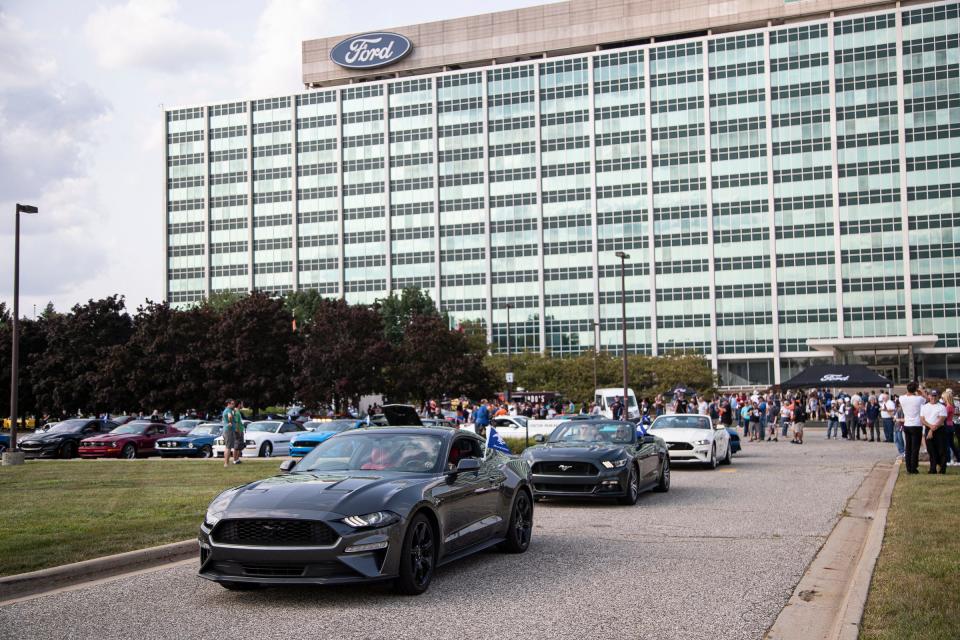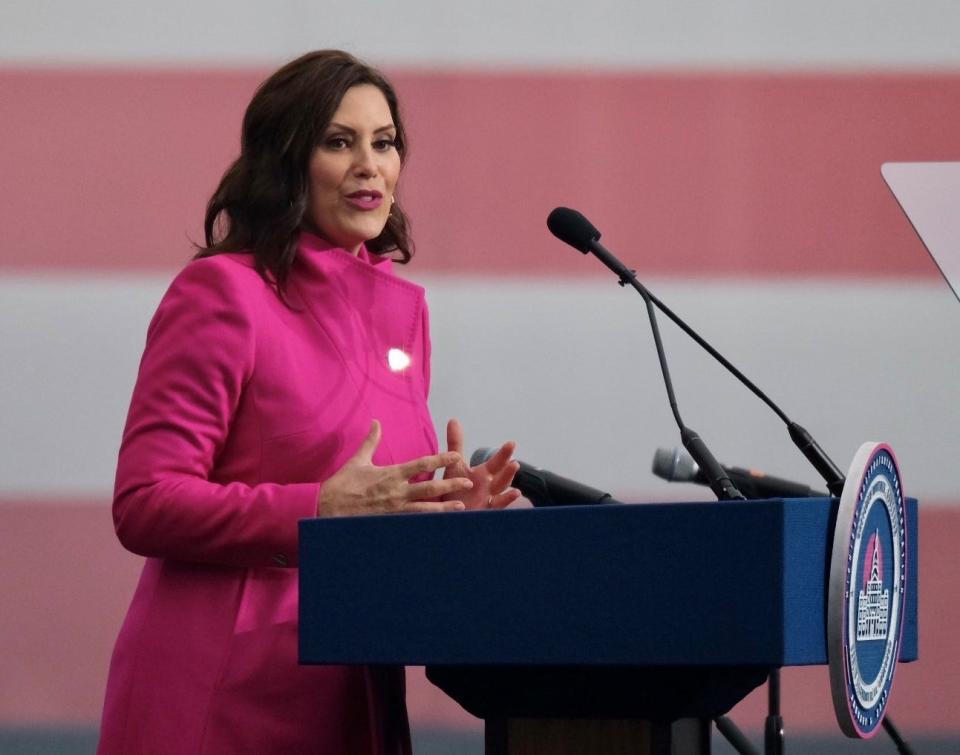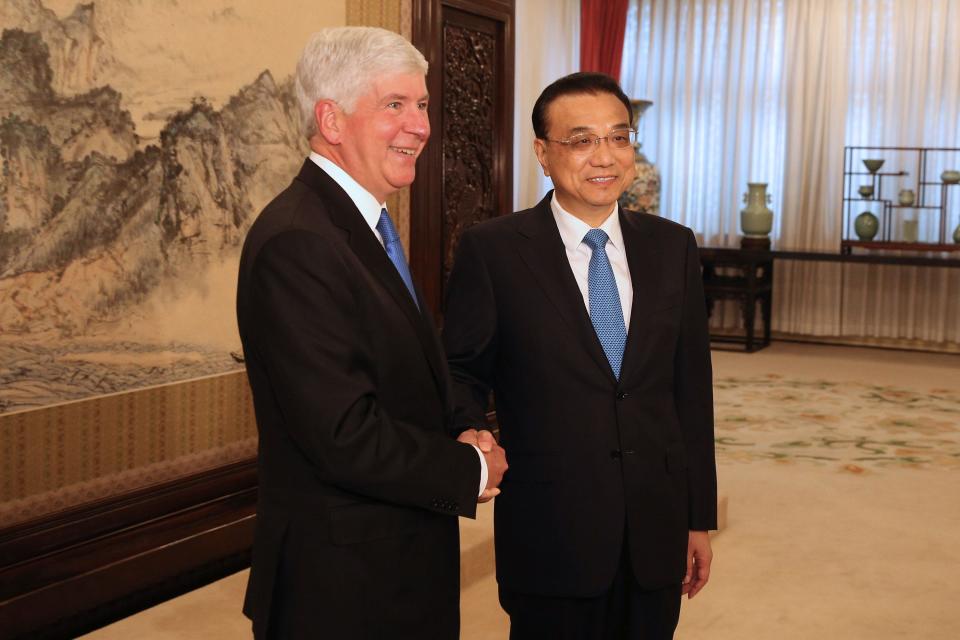Republican governor makes strong accusation against Ford – and it could help Michigan
Michigan is a potential front-runner for a massive new economic development deal, thanks, in part, to the Virginia governor suggesting Ford Motor Co. and a partner company are conduits for communism and the Chinese government.
The ripple effects of this business and political decision from Virginia Gov. Glenn Youngkin, a Republican, will have a real impact on the Dearborn automaker and the people of Michigan, economic and political analysts tell the Detroit Free Press, part of the USA TODAY Network.

In the short term, it may give Michigan the leg up to land another huge deal: Reports indicate the Virginia plan Youngkin turned down was a $3.5 billion battery plant with the possibility of 2,500 jobs. Gov. Gretchen Whitmer and other state leaders aren't talking about this project at the moment, but according to other news reports and a source close to the negotiations who was not authorized to speak publicly, the state is in the running for the site and state leaders have championed others that involved Chinese-owned companies.
The dynamic situation also foreshadows a political climate that may drastically change how Ford and other electric vehicle manufacturers, at times reliant on Chinese companies, operate in the U.S. And it sets the stage for China-bashing by politicians jockeying for the next election cycle.
That's a twist unlikely to benefit Michigan businesses or workers, argued former Gov. Rick Snyder, who called Youngkin's battery plant decision "overreaching."
"I recognize that there are serious national and strategic issues that we have with China. We have some fundamental differences. But as a governor, I viewed my role as 'What can I do to help with economic diplomacy? What can I do to increase the well-being of the citizens of my state?' " Snyder told the Free Press on Thursday.
"And that wasn't by being a basher," the Republican said. "That was by using relentless positive action to say you know, let's work hard to build bridges with people to show them why we're a great place to work and live."
More:Ford could cut 8,000 salaried jobs — and still get $100M incentive from Michigan
Will Michigan land the plant?
The source close to negotiations tells the Free Press that Michigan remains in the running for the estimated $3.5 billion project that Youngkin ditched and Ford never discussed publicly.
Ford declined to discuss details with the Free Press of the project, saying negotiations with various parties are sensitive and evolving.
Youngkin did not respond to a Free Press request for comment. But he told other media outlets he didn't want the battery plant to receive renewable energy tax credits because of the project's association with Ford's partner on the plant, a company called Contemporary Amperex Technology Co. Ltd..

"While Ford is an iconic American company, it became clear that this proposal would serve as a front for the Chinese Communist party, which could compromise our economic security and Virginians’ personal privacy," Macaulay Porter, Youngkin's spokesman, told multiple media outlets. "Virginians can be confident that companies with known ties to the Chinese Communist Party won’t receive a leg up from the Commonwealth’s economic incentive packages."
The Chinese company, which counts among its customers Tesla and Honda, is a primary supplier of lithium-ion batteries, a key component needed for the fast-growing electric vehicle industry in Michigan and elsewhere.
One-third of the world's EV batteries come from the Chinese company. It increased its share of the market from 32% in 2021 to 34% in 2022, according to visualcapitalist.com, a business trends and investment site.
The company has a location in Auburn Hills, Mich., and large subsidiaries elsewhere in the U.S., Canada, France and Japan, according to its website. In August, it announced a $7.6 billion battery factory in Hungary to build battery cells and modules for automakers including Mercedes-Benz, BMW, Stellantis and Volkswagen, Reuters reported.
Various media outlets have said Ford would own all physical structures and the Chinese company would run factory operations and technology.
Contemporary Amperex Technology did not respond to a request for comment.
Ford spokeswoman Melissa Miller told the Free Press, "I can’t comment on confidential site selection processes, but I can confirm that our talks with CATL, the world’s leading battery producer, continue."
She added, "Last year, Ford announced an MOU (memorandum of understanding) with CATL to explore their supplying batteries for Ford vehicles and said that we plan to localize LFP (lithium-ion phosphate) battery production in North America."
More:Ford partners with Tesla co-founder on battery recycling, better supply chain
More:Ford CEO Farley says electric vehicles will be sold 100% online, have nonnegotiable price
Chinese investment in Michigan
Whitmer declined to comment on any specific deal, as did leaders of the state House and Senate.

Last year, Whitmer and Michigan politicians of both parties championed a deal that included hundreds of millions in incentives to bring a Chinese-owned company to Big Rapids. Generally, the governor and state lawmakers herald economic development deals, especially when they involve U.S. carmakers.
Whitmer and other leaders sustained criticism after they saw an $11 billion investment by Ford in electric vehicles and nearly 11,000 jobs go to Kentucky and Tennessee in 2021.
In the past, a bipartisan majority in the Michigan Legislature agree to support these projects.
There's every indication that will continue to happen. Speaking this week in Davos, Switzerland, at the World Economic Forum, Whitmer talked about the state's efforts to grow its advanced manufacturing sector. During her first trade mission to Europe, her office said the governor also stopped in Oslo, Norway, and Zurich for meetings with business and government leaders to discuss clean energy technology and future investment opportunities as Michigan seeks an edge in the growing electric vehicle industry.
However, Whitmer did not answer Free Press questions about whether it was appropriate to offer tax incentives to Chinese-owned companies. Neither did GOP or Democratic leaders in the Michigan House and Senate.
House Rep. Andrew Fink, R-Adams Township, says Youngkin's concerns about Chinese influence are valid.
"I just don't think that any company in China is truly private, given the power that the (Chinese Communist Party) has – essentially complete control of the government, and, obviously, much more restrictive control over speech and private organizations and everything that Americans consider acceptable," he told the Free Press.
"When it's a country that has a communist regime at the top of that power structure, I just don't see why an American government would be comfortable partnering with a company that is in that position," Fink said.
Other GOP lawmakers echoed those concerns, included state Rep. Andrew Beeler; the Port Huron Republican sent a news release referring to the "tyrannical authority" of the Chinese government and challenging the idea of Whitmer trying "to welcome this company to our state."
More:GM keeps plants running in China by asking workers to live in factory, sleep on floors
More:China threatens to sideline U.S. automakers in booming EV tech
Strategic ways to recruit jobs
The push to drastically alter business relations in Michigan and nationally with the globe's largest importer of U.S. goods is not new. But any substantial shift that blocks job creation in the state harms Michigan, Snyder argued.
The federal government is responsible for national security policies, he said. States obviously have a role in their own security, but he questioned whether isolation was the best strategy for improving relations with China.
"The role of state and local government isn't to be involved in strategic issues, making decisions on areas of disagreement between nations. ... Is it better to just push people away and say you have disagreements with them, not talk to them and be in conflict with them, or is it better to find ways to work together on things where we do have common ground," Snyder said.
"If you can find common ground with someone, usually that can be a starting point to resolving much more difficult issues, in addition to the fact it brings economic good to our state and to our nation," he said.
Snyder, who served from 2011 through 2018, aggressively reached out to China and Chinese companies to bring jobs to the state. By 2018, he had traveled to China eight times to tout Michigan's manufacturing, mobility, agriculture and tourism sectors.

More:GM invests in nickel and cobalt operation in Australia
'Ask yourself'
Snyder generally opposes publicly funded tax incentives – he campaigned against them and helped nix the state's film incentive program – and said he has no direct financial ties to any Chinese company. He still argues incentives are short-term fixes that can't account for long-term improvements to a state's business climate but said there's a time and a place for encouraging developments with Chinese-owned companies that can dovetail into bringing many more related manufacturers to the state to address the supply chain challenge.
"Ask yourself the question in this particular case with a battery plant: are we better off having batteries made in China or batteries made in Michigan, or Virginia?" Snyder said.
Tudor Dixon, the Michigan GOP gubernatorial candidate in 2022, raised the issue of recruiting Chinese battery companies during the campaign after Michigan offered $715 million in incentives to Gotion Inc. to build a $2.4 billion plant near Big Rapids.
"She can tell you all she wants that she is improving economic development and keeping automotive jobs here," Dixon said during a debate in October. "But we're hearing that battery plants are going outside of Michigan unless they're owned by the Chinese."
That line of attack failed to resonate with Michigan voters: Whitmer won reelection by double digits, and Democrats swept state government. But it may appeal more broadly to Republican activists choosing the party's next presidential nominee.
The politics of China
Automakers are watching closely as the anti-China rhetoric heats up in state and national politics.
Youngkin has positioned himself as tough on China while dominating headlines for days. It comes after Florida Gov. Ron DeSantis, another likely presidential candidate, continues to take actions targeting China and Chinese business; last fall he announced a plan to "counteract (the) malign influence of China," as indicated in a September news release. Former President Donald Trump, who has already announced he's running again in 2024, on Wednesday called for "new restrictions on Chinese ownership of any vital infrastructure in the United States" among other actions aimed at reducing Chinese investment in the U.S.
But this isn't just confined to GOP presidential hopefuls.
Last year, the Biden administration took actions aimed at limiting China's ability to buy or produce certain computer chips. President Joe Biden also plans to issue executive orders that will greatly expand regulatory powers over U.S. investments in China and limit the data Chinese apps like TikTok can collect in the U.S., according to Politico.
Marick Masters, a business professor at Wayne State University, said the GOP political landscape is going to have a dramatic effect on economic development projects in the near term and later.
"They will try to roll back China's imprint in the United States in a variety of ways," said Masters, who has also worked as an adjunct professor of political science.
"They believe the existential threat to the United States is China through the Chinese Communist Party and that we really need to roll back the involvement of the Chinese in our universities and various businesses, which have implications for national security and manufacturing and industrial policy. ... A lot of people may dismiss it and say it's not serious. But this group is in control of the (U.S.) House."
On the economic development front, policy declarations like the one from Youngkin likely portend well for Michigan and other states that appear open to Chinese-owned companies.
Bruce McDonald III, an associate professor of public administration at North Carolina State University, told the Free Press that the China debate is likely to reduce state competition as GOP leaders take their states out of contention for projects.
"And that's probably a good thing for states overall," he said. "The level states compete (at) is way too high compared to what they bring back to the states. Some states have given up trying to compete because they just can't afford to."
The drama in Virginia is foreshadowing what the future holds for corporate America, said Melissa Bradley, a business professor at Georgetown University.
"Ford is going to get some invites from governors in states that recognize this level of cooperation is required to create economic influence," she said.
"The irony is that the places where jobs are needed the most are led by people who want to lock every economic driver out. These folks are stuck on stupid. They’re standing up for political ideology that undermines the economic stability of their own state. It makes no sense whatsoever."
Reporter Clara Hendrickson contributed to this report.
Contact Phoebe Wall Howard: 313-618-1034 or phoward@freepress.com. Follow her on Twitter @phoebesaid. She covers the Ford Motor Company beat as part of The Detroit Free Press autos team. Subscribe for exclusive stories about the Dearborn carmaker.
Contact Dave Boucher: dboucher@freepress.com
This article originally appeared on USA TODAY: Ford and China: Snyder, others on what Virginia move means for Michigan
